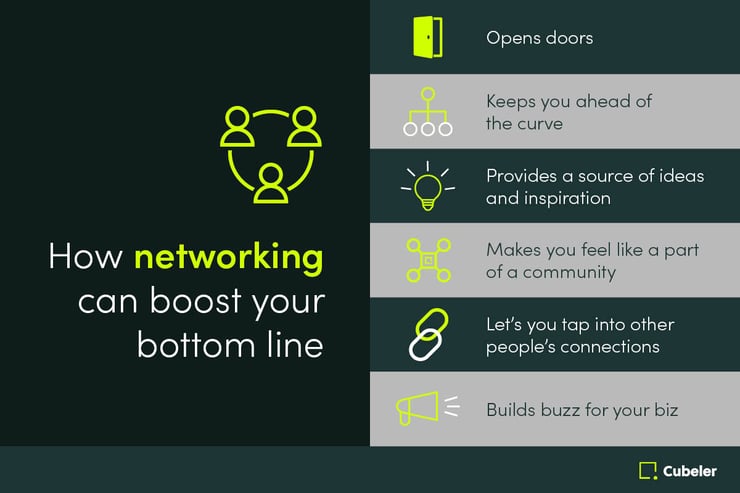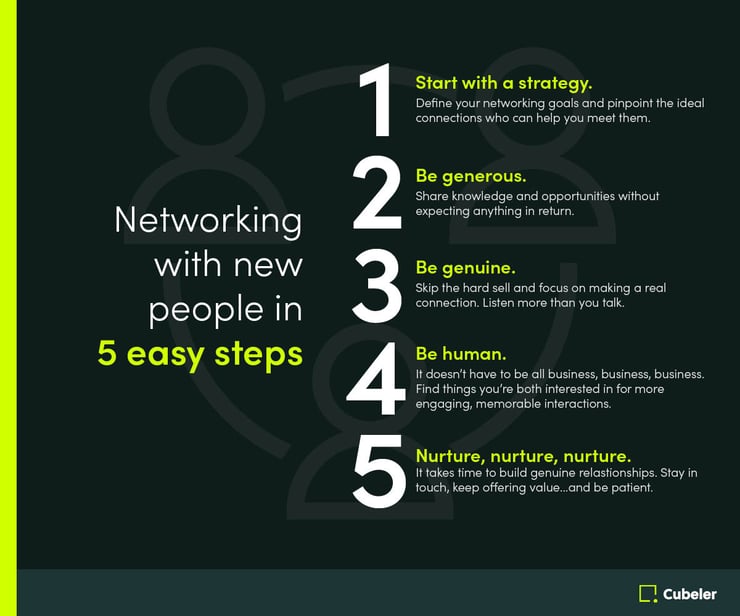The 10 Biggest Supply Chain Lies Out There
Uncover the truth behind the 10 biggest supply chain management lies and achieve operational excellence with proven,...
6 min read
By:
Cubeler en-ca
29-Jan-2024 11:29:44 PM

Expand your SME business network the right way. Learn how to connect with like-minded SME owners and decision-makers to showcase your business to a relevant audience and build the long-term connections you need to grow your business.
A healthy business network is one of your greatest assets. It can help you open doors to new opportunities, increase your access to industry expert insights, overcome business hurdles, stay on top of the latest trends, find the best talent and partners, and reach your target audience effectively.
But building your business network isn’t just about going to uncomfortable events and exchanging business cards with people you’ll forget within five minutes.
The foundation of a strong network is genuine connection: having things in common, extracting mutual value from the relationship and, well, just getting along. You can’t make that kind of connection at a single networking event.
Building out your business network takes time, patience and the willingness to put in the work. But it's work worth doing: the more effort you put in, the more value you get out—guaranteed.

The colleague who connected you with that “perfect fit” employee. The person who’s always posting industry trends that help you make important decisions. The friend of a friend of a friend who just became your newest client. That's your business network.
Who you know can positively impact your bottom line. That’s why a strong network has so many benefits:
Networking opens doors. From generating business leads to creating partnerships, knowing people who know people is a big contributor to seizing the best opportunities and, ultimately, bringing you business success.
Networking keeps you ahead of the curve. A strong network is like your very own personal advisory board—in other words, a treasure trove of thought leadership, industry insights, best practices and benchmarks. You can see how other SMEs tackle the same challenges you face. Learn from people who have “been there, done that” and can give you feedback that makes you see things in a new light.
Networking is a source of ideas and inspiration. There's nothing like knowing people who can inspire you and open your eyes to new possibilities. Plus, connecting to successful networkers can show you how to get better at it yourself. If, for example, you want to be an industry influencer, see how your go-to experts do it and emulate their approach.
Networking makes you feel like part of a community. Owning a business can be isolating. A well-built network brings you into contact with people who “get” you because they face the same things you do everyday. Staying connected, sharing successes and failures, and getting a sense of how they do things can help you keep a positive mindset and feel more supported.
Networking lets you tap into other people's connections. Every person you know comes with their own valuable set of connections. If you need something, someone will usually know someone that can help. The benefits compound with each person you add to your network.
Networking builds buzz for your biz. The more people you know, the more word of mouth about you will spread. They will share your content, see you as an expert in your field and recommend you to their friends and colleagues.
Traditional, face-to-face networking certainly has its place. After all, sharing an experience with other business owners can be crucial to forging a meaningful connection. But let's face it: the COVID-19 pandemic changed the way we network. You probably now have lots of people in your network you've never spent time with beyond a chat or a video screen.
Using online tools makes networking easier—especially if you’re busy (aren’t we all?), don’t live in a central location, or are a bit of an introvert.
Online networking is cheaper too: there are no restaurant bills or conference expenses. And it's easier to find and connect with the people you want to know. It’s also less intimidating than connecting in person. Not everyone is an extrovert and approaching people “IRL” (in real life) can be…scary.
Networking online levels the playing field. It's easier to access more senior people, and you aren't limited by geography, so your reach grows exponentially. And there are so many options out there for connecting online, specifically for SMEs, allowing you to connect quickly with other SME owners and decision-makers—for zero cost.
So how do you build a solid SME network? With a solid strategy.
The first thing you should do is define the goals of your strategy. You should ask yourself these questions:
What do you want to get out of networking?
Are you looking to land a contract, build your customer base or find suppliers?
Do you want bounce ideas off other business executives?
Do you need to learn from experts in your field?
Ultimately, you need to look at your network as a puzzle: what pieces are missing and what gaps do you need someone else to fill? Figure out who can help you attain your networking goals and focus on achieving them via networking.
Once you have your goals figured out, it's time to identify the right tactics for building a network that can grow your business.
Join online communities and industry-specific networks. Attend conferences, workshops, events, and professional and trade associations. Spend time in the same places as the people you want to meet.
The best contacts are people who share their knowledge, have large networks and are willing to help others. Zero in on the connectors and influencers to cultivate the right relationships. It's better to know five well-connected people than to have 50 casual contacts.
Raising your hand to help out at an industry association, offering to speak at a workshop or acting as a mentor to an up-and-comer can help you learn more, deepen your relationships and make you visible to the people who matter most.
Come up with a 30- to 60-second pitch about what you do. Avoid industry jargon and focus on the benefits to your customer: “I help people do XYZ.”
While it's great to focus on customers or experienced industry players, don't overlook younger, less experienced connections. Building your network is a long-term play. For example, mentoring newbies now can, lead to opportunities with these grateful connections down the road.
Always be on the lookout for opportunities. A mom from your kid’s school could be the perfect vendor, and that friend of a friend could be the IT whiz you've been looking for. Getting to know people—no matter the industry—is never a waste of time.
Networking is a marathon, not a sprint. It's something you must work on constantly, and it can take months or even years for a connection to come to fruition. So, if a deal doesn't close immediately, stay in touch. Treat your network like a garden: plant the seeds, water your garden and nourish it, and you'll get results. The connections who aren't panning out just now could be valuable in the future.
Focus on how you can provide value to your connections—without expecting anything in return. As you build a reputation as someone who gives from a genuine place, your connections will multiply. How?
Share knowledge by posting helpful content or offering mentoring
Introduce people or tell them about an opportunity
Offer a free trial of your product or service
When you show you’re interested in or curious about what someone does, they're much more likely to be engaged. Ask questions and really listen to the answers: you’ll learn more about the people in your network and build trust.
Do your potential and existing connections like to travel? Did you go to the same school as them? Did you grow up in the same town? Do you share a similar ethnic background? Connecting over a shared interest makes for memorable conversations and helps build genuine relationships.
Unless a person has specifically invited you to talk about your product or service, they probably don't want to be sold on anything. Provide value (see “Be a giver” right above) without a not-so-hidden agenda.
If someone doesn't respond to you right away, don’t write them off. People are busy, so find ways to stay on their radar. Stay in touch without being pushy: publish content regularly or send an occasional message with a link to helpful information, an invitation to an industry event or anything else they might find useful.

While it takes time to build a solid network (remember: marathon, not sprint), there are a few things you can do to speed things up a little.
Start with your current contacts. It's fine to go after new relationships, but are you doing your best with the ones you already have? Choose a few people every week and connect with them by sending a resource you think they might find helpful.
Put yourself out there. Join online conversations (and keep your comments positive). Start new conversations by posting an opinion, question or poll and engaging with the responses.
Ask for connections. Reach out to your existing contacts and ask, “do you know anyone who…?”
Check out your peers. See what others in your corner of the SME world are doing, both online and offline, attending conferences, and other events. Follow their lead.
Start with a strategy. Determine your networking goals and, once you’re done, identify the people who can help you meet them goals and find ways to connect with them.
Leverage your current contacts. While new connections have potential, make sure you’re doing your best with the ones you already have.
Put yourself out there and be active by joining online conversations and starting new ones.
People respond best to genuine networking efforts without a hidden agenda. Don’t you?
Networking is a long-term play, so be patient. It’s a marathon, not a sprint, so it takes time and effort to nurture and grow your connections.
Provide value without expecting anything in return. Connect people, share your knowledge and tell your connections about opportunities. Your generosity will come back to you.
Networking is an investment, just like any other business-building activity.

Uncover the truth behind the 10 biggest supply chain management lies and achieve operational excellence with proven,...

Discover how to sidestep the top 10 digital transformation fails with a step-by-step plan to integrate the right...

Enhance your marketing expertise with our free Marketing Plan Workbook, tailored specifically for small business owners...